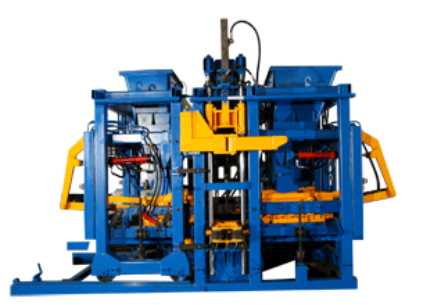Dalam beberapa tahun terakhir, Industri konstruksi telah menyaksikan kemajuan yang signifikan dalam teknologi yang terus membentuk kembali cara bangunan dan infrastruktur dibangun. Salah satu inovasi yang menonjol adalah mesin pembuat blok otomatis. Peralatan mutakhir ini telah merevolusi proses memproduksi blok beton, menawarkan efisiensi yang luar biasa, presisi, dan efektivitas biaya.
Mesin Pembuat Blok Otomatis
Mesin Pembuat Blok Otomatis adalah perangkat canggih yang dirancang untuk mengotomatiskan produksi blok beton, batu bata, dan unit batu lainnya. Mesin -mesin ini menggunakan teknologi canggih dan prinsip -prinsip teknik untuk merampingkan proses pembuatan, Mengaktifkan produksi berkecepatan tinggi dengan intervensi manusia minimal. Peralatan terdiri dari berbagai komponen, termasuk mixer beton, sistem batching, mekanisme pemberian makan material, blok cetakan, Sistem hidrolik, dan panel kontrol.
Fitur dan fungsi utama
Mesin pembuatan blok otomatis menawarkan berbagai fitur dan fungsi yang mengesankan yang berkontribusi pada efisiensi dan keserbagunaannya. Beberapa fitur penting termasuk:
A) Kapasitas Produksi Tinggi: Mesin -mesin ini dapat menghasilkan sejumlah besar blok dalam waktu yang relatif singkat. Dengan pemberian makan material otomatis, percampuran, cetakan, dan memblokir proses ejeksi, Mereka dapat mencapai tingkat produksi yang tinggi, Meningkatkan jadwal proyek dan produktivitas.
B) Dimensi dan kualitas blok yang tepat: Mesin pembuatan blok otomatis memastikan dimensi blok yang konsisten dan kualitas dengan menggunakan teknik cetakan yang tepat dan pemadatan yang seragam. Ini menjamin keseragaman dan kekuatan di blok yang diproduksi, memenuhi standar dan spesifikasi industri.
C) Fleksibilitas dalam desain blok: Mesin -mesin ini memungkinkan untuk produksi berbagai desain blok, ukuran, dan bentuk, melayani beragam kebutuhan konstruksi. Dengan hanya mengubah cetakan, Kontraktor dapat membuat blok untuk dinding, trotoar, pagar, dan elemen struktural lainnya, Memberikan fleksibilitas desain dan opsi kustomisasi.
D) Efisiensi energi: Mesin pembuatan blok otomatis dirancang untuk mengoptimalkan konsumsi energi. Memanfaatkan motor yang efisien, Sistem hidrolik, dan mekanisme kontrol otomatis, Mereka meminimalkan limbah energi, mengakibatkan berkurangnya biaya operasional dan dampak lingkungan.
Keuntungan dan Manfaat
Pemanfaatan mesin pembuatan blok otomatis menawarkan banyak keuntungan bagi proyek konstruksi dari semua skala. Beberapa manfaat utama termasuk:
A) Peningkatan efisiensi dan produktivitas: Dengan mengotomatiskan proses produksi blok, Mesin -mesin ini secara signifikan mengurangi kebutuhan tenaga kerja dan meningkatkan efisiensi proyek secara keseluruhan. Output yang konsisten, Tingkat produksi yang tinggi, dan pengurangan upaya manual berkontribusi pada penyelesaian proyek konstruksi yang lebih cepat.
B) Efektivitas biaya: Mesin pembuatan blok otomatis membantu meminimalkan biaya yang terkait dengan tenaga kerja, limbah material, dan pengerjaan ulang. Proses produksi yang dioptimalkan memastikan penggunaan material yang tepat, Mengurangi limbah dan meningkatkan efektivitas biaya.
C) Kontrol kualitas yang ditingkatkan: Sifat otomatis dari mesin -mesin ini memastikan kualitas blok yang konsisten, meminimalkan variasi dan cacat. Ini menghasilkan integritas struktural yang ditingkatkan, daya tahan, dan kepuasan pelanggan.
D) Penghematan waktu: Dengan siklus produksi yang lebih cepat dan berkurangnya tenaga kerja manual, Mesin Pembuat Blok Otomatis Menghemat banyak waktu, memungkinkan kontraktor untuk memenuhi tenggat waktu proyek dan mengambil proyek tambahan.
e) Keberlanjutan: Mesin -mesin ini mempromosikan keberlanjutan dengan menggunakan bahan yang ramah lingkungan seperti beton dan meminimalkan pembangkitan limbah. Lebih-lebih lagi, Desain hemat energi mereka berkontribusi pada pengurangan jejak karbon dan konservasi sumber daya.
Aplikasi dan prospek masa depan
Mesin Pembuat Blok Otomatis Menemukan Aplikasi Dalam berbagai proyek konstruksi, termasuk perumahan, komersial, dan perkembangan infrastruktur. Mereka digunakan untuk pembuatan blok yang digunakan di dinding, yayasan, trotoar, dinding penahan, lansekap, dan banyak lagi. Saat industri konstruksi terus berkembang, Permintaan mesin tersebut diharapkan tumbuh secara eksponensial.
Melihat ke depan, Prospek masa depan untuk mesin pembuatan blok otomatis menjanjikan. Kemajuan teknologi, seperti integrasi kecerdasan buatan, IoT, dan otomatisasi, cenderung lebih meningkatkan kemampuan mereka. Sistem kontrol yang ditingkatkan, pemantauan jarak jauh, dan pemeliharaan prediktif akan mengoptimalkan kinerja mesin, memastikan operasi terus menerus dan waktu henti minimal.
